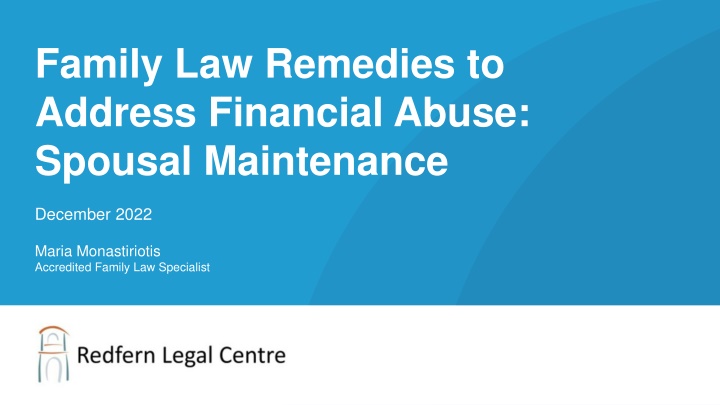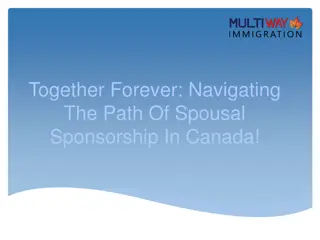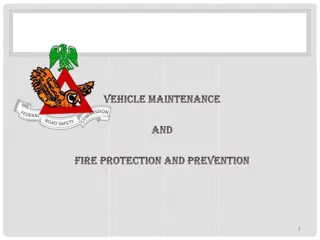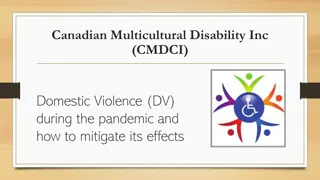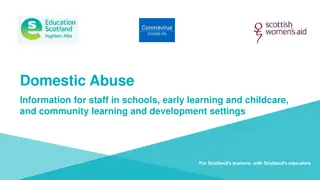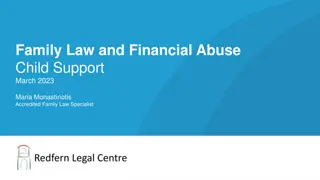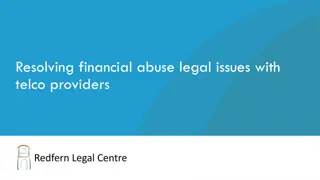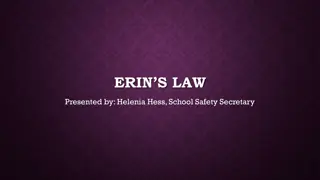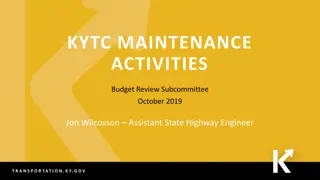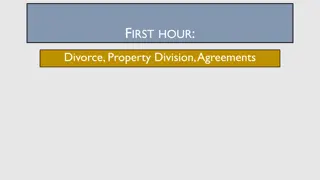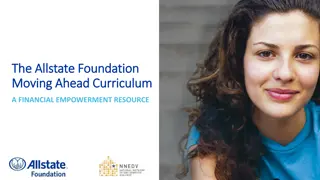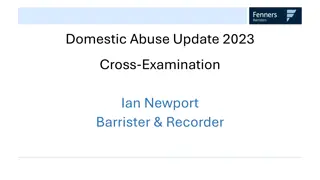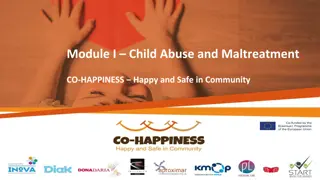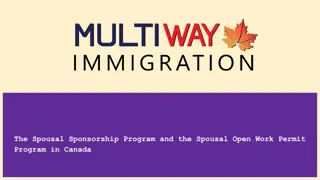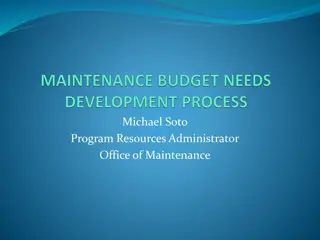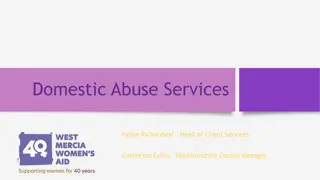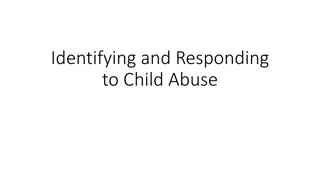Addressing Financial Abuse in Family Law: Spousal Maintenance Insights
Financial abuse, a form of family violence, involves the misuse of money to control and manipulate a partner. This article explores the impact of financial abuse in the context of spousal maintenance, discussing common behaviors, legal definitions, and remedies available under family law. Gain valuable insights into understanding, identifying, and addressing financial abuse in family law situations.
Download Presentation

Please find below an Image/Link to download the presentation.
The content on the website is provided AS IS for your information and personal use only. It may not be sold, licensed, or shared on other websites without obtaining consent from the author.If you encounter any issues during the download, it is possible that the publisher has removed the file from their server.
You are allowed to download the files provided on this website for personal or commercial use, subject to the condition that they are used lawfully. All files are the property of their respective owners.
The content on the website is provided AS IS for your information and personal use only. It may not be sold, licensed, or shared on other websites without obtaining consent from the author.
E N D
Presentation Transcript
Family Law Remedies to Address Financial Abuse: Spousal Maintenance December 2022 Maria Monastiriotis Accredited Family Law Specialist
Acknowledgement Of Country
Outline 1. Understanding financial abuse 2. Financial abuse relevant to spousal maintenance 3. Understanding spousal maintenance 4. Types of Orders that can be made 5. Grounds for making a spousal maintenance order 6. Relevant factors 7. Enforcement 8. Questions & resources RESOURCES: www.rlc.org.au/training/resources/financial-abuse
Understanding financial abuse
What is financial abuse? Financial or economic abuse is a form of family violence (also known as domestic violence) where an abuser uses money to gain power and to control their partner. Family violence is defined under the Family Law Act, 1975 (as amended) under section 4AB. It means violent, threatening or other behaviour by a person that coerces, a member of the person s family or causes the family member to be fearful. There is no single agreed legal definition of domestic violence in Australia.
Common behaviours 1. Control over day-to-day household finances & material wellbeing 2. Denying accumulation of personal assets or eroding those assets 3. Manipulating credit and debt to the abused partner s disadvantage 4. Blocking access to social and economic participation 5. Financially monitoring, over-controlling and scrutinising their partner 6. Refusing to contribute 7. Exploiting women sexually in exchange for money SOURCE: Restoring Financial Safety: Legal Responses to Economic Abuse (see Resources)
Financial abuse relating to spousal maintenance
Financial abuse behaviours relating to spousal maintenance Behaviour may include: Denying access to money such that the person is unable to meet their financial needs Partner denying access to bank accounts, credit cards and/or redraw facilities Partner maintaining control over money so that person are financially dependant Partner changing employment or using business to reduce income to avoid spousal maintenance
Behaviours (cont.) Partner refusing to make mortgage instalments or partner placing pressure on person to contribute to mortgage even though person has left the home Partner removing person from health insurance Partner cutting access to Foxtel, Netflix, internet Partner cutting off any essential services that benefit the person Partner failing to lodge taxation returns so lower income is used for child support assessment Forcing a person to enter into a personal loan, credit card, mortgage or provide a guarantee Forcing a person to take out social security
Financial abuse continues after separation - creating financial and legal difficulties which impact the person and their children.
Financial abuse in First Nations communities Can occur within broader family system brothers, sisters, aunts, uncles, parents, nieces, nephews Humbugging & resource sharing can be positive (sharing and support) or negative (financial harassment and abuse, leading to increased financial stress) Additional challenges in accessing support due to language barriers, mistrust of authorities, cultural norms re discussing finances, financial literacy Gendered Violence Research Network, Understanding Economic and Financial Abuse in First Nations Communities (March 2021)
Financial abuse in CALD communities May not identify with economic abuse or financial abuse or be comfortable accessing mainstream services Some specific forms of financial abuse eg dowry-related abuse Additional challenges in accessing support due to language barriers, isolation, cultural norms (family cohesion, men as responsible for financial management), mistrust of police and courts, lack of familiarity with socioeconomic and legal systems, immigration risks, lack of financial support Gendered Violence Research Network, Understanding Economic and Financial Abuse Across Cultural Contexts (June 2021)
When will someone seek help? While they are in an abusive relationship When they are making plans to leave Immediately after they have left Many years after the relationship has ended
Understanding spousal maintenance
What is spousal maintenance? Spousal maintenance is a financial order that can be made by the Federal Circuit and Family Court of Australia requiring a person to pay money to their former partner so that the partner can meet their reasonable financial needs. The order relates solely to the financial needs of the partner and not the financial needs of children.
What is spousal maintenance? (cont.) The Court can order a person to: (a) Pay a periodic amount either weekly, fortnightly or monthly. (b) Pay a lump sum amount. (c) Payment of installments due on a mortgage or liability. (d) Transfer a property. A spousal maintenance order does not prevent a third party from seeking arrears from the person.
Time Limitation MARRIED COUPLES: WITHIN 12 MONTHS FROM THE DATE OF THE DIVORCE ORDER DE FACTO COUPLES: WITHIN 2 YEARS FROM DATE OF SEPARATION
Orders that can be made URGENT INTERIM FINAL
Urgent Spousal Maintenance Order An urgent order can be made when a person is in immediate need of financial assistance. It is a temporary order allowing time for an interim application to be determined.
Interim Spousal Maintenance Order An interim spousal maintenance order is a temporary order that remains in force until a further order is made by the Court including a final order or until a specified time.
Final Spousal Maintenance Order A final spousal maintenance order is an order that ends the proceedings. It can be a periodic order, an order that terminates at a specified time or a lump sum order. The Court has an obligation to as far as practicable to end the financial relationship between the parties and avoid further proceedings.
Grounds for making a spousal maintenance order
Requirements for a Spousal Maintenance Order The person applying must show that they are unable to meet their financial needs. The person applying must show that the other party has the capacity to pay the spousal maintenance sought
Examples Examples of reasons why a person may be unable to support themselves: They have the primary care of a child There are health reasons why they are unable to obtain employment. They have a physical or mental incapacity They have been out of the workforce for many years They have worked solely in the family business They are currently studying
Bankruptcy An application for maintenance can be made by a non bankrupt person. The bankruptcy trustee must be joined as a party to the proceedings. The bankrupt person is not entitled to have a say in what happens to vested bankruptcy property without leave of the Court.
Relevant factors to be considered when determining a Spousal Maintenance application
Matters to be considered Income, property and financial resources and capacity for employment Care of a child under 18 years Age and state of health Eligibility for a pension, allowance or benefit (including overseas pension, superannuation entitlement). Necessary commitments to support a person or child they have an obligation to support The responsibilities to support another person
Matters to be considered (cont.) Whether it will allow a person to undertake further study which will increase their earning capacity or to establish themselves in a business The effect of any order on a creditor s ability to recover a debt A standard of living that is reasonable Whether the applicant has contributed to the income, earning capacity, financial resources of their partner. The length of the relationship and whether it has impacted a person s earning capacity The need to protect a person who wishes to continue their role as a parent.
Matters to be considered (cont.) If a person is cohabiting with another person, the financial circumstances of that cohabitation. Any order financial order made for the benefit of a de facto Any property settlement order made Any other fact or circumstance that may be relevant Any child support payable The terms of any financial agreement
Enforcement A spousal maintenance order can be registered with Services Australia for collection.
Childbearing expenses A person can seek maintenance during pregnancy for the period two months before birth and three months after birth if the parties were not married. They can seek a periodic amount, lump sum amount, payment of expenses and set up costs for the baby.
Other avenues INTERIM PROPERTY ORDER CHILD SUPPORT DISCUSSED IN DETAIL IN OUR OTHER FINANCIAL ABUSE AND FAMILY LAW SEMINARS
Questions and further resources Maria Monastiriotis Accredited Family Law Specialist Financial Abuse Service NSW Redfern Legal Centre RESOURCES: www.rlc.org.au/training/resources/financial-abuse
Redfern Legal Centre Credit, Debt & Consumer Law Inner Sydney Tenants Advice & Advocacy Service Employment Law Police & Government Complaints International Student Legal Service NSW Health Justice Partnership Financial Abuse Service NSW
Structure 1. State-wide legal assistance Policy, Law Reform & Capacity Building 2. Training & resources Legal Service for community workers 3. Systemic change through policy & law reform
How we assist Free, confidential legal advice (via telephone, Zoom, face-to-face) Co-advice appointments with experts in family law & credit / debt / consumer law Representation in eligible cases Available to all people in NSW who have experienced financial abuse in an intimate partner relationship Lawyers are trauma informed, understand safety risks and the complexities of abusive relationships Non-legal needs and social support referrals
Fact Sheets Property Settlement Spousal Maintenance Child Support 10 steps to follow when separating The court process Children & parenting What is family violence?
How to contact us 1. Website, including online form: https://rlc.org.au/fas 2. Call us on 0481 730 344 3. Email us: falsintake@rlc.org.au
When we cant assist Elder abuse or financial abuse outside of intimate partner relationships refer to the National Debt Helpline https://ndh.org.au/ 1800 007 007 orthe Seniors Rights Service https://seniorsrightsservice.org.au/ Credit, debt and consumer law problems that are not connected to the client s experience of financial abuse local community legal centre or Legal Aid. Family law issues where there are no interconnected credit and debt issues refer to local community legal centre or Legal Aid.
Learn more about RLCs work Sign up for our eBulletin www.rlc.org.au Follow us Facebook (@redfernlegal) Twitter (@RLC_CEO) Instagram (@teamRLC)
Resources on financial abuse www.rlc.org.au/training/resources/financial-abuse https://earg.org.au/resources-for-community-workers
Before You Go Your feedback helps us improve our training. Please stay with us for another 30 seconds Training: rlc.org.au/what-we-do/training Enquiries: Nick Manning education@rlc.org.au This webinar is a guide to the law in Australia. It is not a substitute for legal advice. If you have a legal problem, seek legal advice from a legal centre or Legal Aid.
